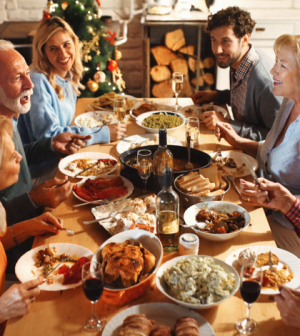- Finding Unshakable Power in a World That Wants to Pull Us ApartPosted 6 months ago
- What could a Donald Trump presidency mean for abortion rights?Posted 6 months ago
- Financial Empowerment: The Game-Changer for Women in Relationships and BeyondPosted 7 months ago
- Mental Health and Wellbeing Tips During and After PregnancyPosted 7 months ago
- Fall Renewal: Step outside your Comfort Zone & Experience Vibrant ChangePosted 7 months ago
- Women Entrepreneurs Need Support SystemsPosted 7 months ago
Thanksgiving and Ikigai

By Jean Janki Samaroo
Thanksgiving is this weekend in Canada and in keeping with tradition, most of us are probably busily preparing to meet up with friends and family around a big turkey dinner. Thanksgiving became a national holiday in 1957. It takes place on the 2nd Monday in October. Originally, the day was set aside as a “public and solemn” recognition of blessings from God. In multicultural Canada, people are free to mark Thanksgiving as they like.
We’re all aware that giving thanks and being grateful is what the holiday is really for. Regardless of religious persuasion, gratitude is important. It doesn’t matter who or what one worships. “Gratitude is not only the greatest of the virtues but the parent of all others.” ~ Marcus Tullius Cicero (January 3,106 BC – December 7, 43 BC)
I’ve just been learning about the Japanese concept of Ikigai and saw that gratitude is one of the ten rules. This shows that across cultures and countries, being thankful reminds us of all the good in our lives that we have to be grateful for – life, food, clothing, shelter, health, family and friends, and the beauty of the world around us. The list could go on and on.
According to Wikipedia, Iki in Japanese means ‘life or alive’ and gai means ‘effect, result, fruit, worth, use, benefit.’ Thanksgiving seems like a good time also to reflect on our aliveness and what meaning or benefit we are adding to the world. The new school year has just begun, we’re into a new season and the temperature outside is also changing.
Francesc Miralles and Hector Garcia, authors, of the best-selling book “Ikigai: The Japanese Secret to a Long and Happy Life” say that: “Our Ikigai is different for all of us, but one thing we have in common is that we are all searching for meaning.” Even if we don’t voice our search, it’s a feeling that we all have. Even if it’s not called Ikigai, we want to feel that our lives matter. How do we usually measure this?
In the Western world, we usually think of what we’re worth in dollars and cents. How much money do we have in the bank? Do we have investments – stocks, bonds, bitcoin? How big is our house and do we own a cottage too? Do we have lots of friends and followers on Facebook, Twitter, and other media platforms? Each woman would measure her worth/meaning differently.
While we need to have the basics – housing, food, water, work, and so forth, there are other indicators of worth. Apart from gratitude, the other nine rules of Ikigai are: stay active; don’t retire; take it slow; don’t fill your stomach; surround yourself with good friends; get in shape for your next birthday; smile; reconnect with nature; live in the moment; follow your Ikigai. The only one I don’t recommend when you’re having your Thanksgiving dinner is “don’t fill your stomach.”
What I like about Ikigai is that it takes the joy one finds in daily life into consideration. Are there things that are enjoyable and that you like to do every day?
Do you like taking a walk in the park with your dog and seeing the trees with their beautiful Fall colours? How about tasting and savoring your morning cup of Cappuccino or afternoon Chai latte? Are you looking forward to going with your “bestie” for dinner tonight?
I love waking up in the morning to see my cat sitting on the night table waiting for me. He loves when I pick him up and hug him and it’s a special moment for me too. Another simple joy is opening the window shade and seeing the sun come streaming into the room. I’m a rusty piano player but I savour the moments when I can just sit and play for fun. We all have those moments or times that bring us joy.
You’ve probably heard the term “Take time to smell the roses.” It’s about slowing down and taking time for the things that are important and really matter to us. As we rush through our days in the hustle and bustle of life, do we stop to think that doing less is alright? It will give us more time to enjoy life. Meaning and value come from doing the simple, ordinary everyday things we like.
I understand that Japanese men say that their meaning and value in life comes from their work and women say that theirs comes from family and being a mother. I would hazard a guess that many modern-day women today would say the same.
We women are living the Ikigai way if we’re waking up with a sense of meaning, joy, and purpose every day. The Ikigai circle has four components that are namely: doing what you love, what you are good at, what the world needs, and what you can get paid for. Ladies, if you haven’t already found your sweet spot, it’s not too late.
It doesn’t have to be just the work you do for money although it’s nice if that’s what your Ikigai comes from. You don’t have to be pursuing some lofty goal or project to live out your Ikigai. Some “old-school” Japanese proponents of Ikigai believe that the traditional Japanese concept of Ikigai is closer to: “…embracing the joy of little things, being in the here and now, reflecting on past happy memories, and having a frame of mind that one can build a happy and active life.” (Ikigai Tribe, 2019)
This Thanksgiving is a good time to reflect on enjoying the little things. Enjoy your turkey dinner and your family traditions if you have those. Take a good look at your family and friends around you and give thanks for them. Try to take a short walk after dinner in the Ikigai way (Stay active) and “smell the Fall leaves.” (Reconnect with Nature)
Happy Thanksgiving!
********
Jean Janki Samaroo lives in Toronto. She is the self-published author of two books. “Late Blooms” is an inspirational book for Senior Citizens and “Making New Friends” is a children’s picture book. These are both available on Amazon.
https://www.amazon.com/author/jeansamaroo
She enjoys writing and has her own blog called “Late Blooms.” https://late-blooms.jeanjankisamaroo.com/
She studied Library Arts at Ryerson University and is also a certified TESL/TEFL instructor. Her writing explores many diverse topics.







